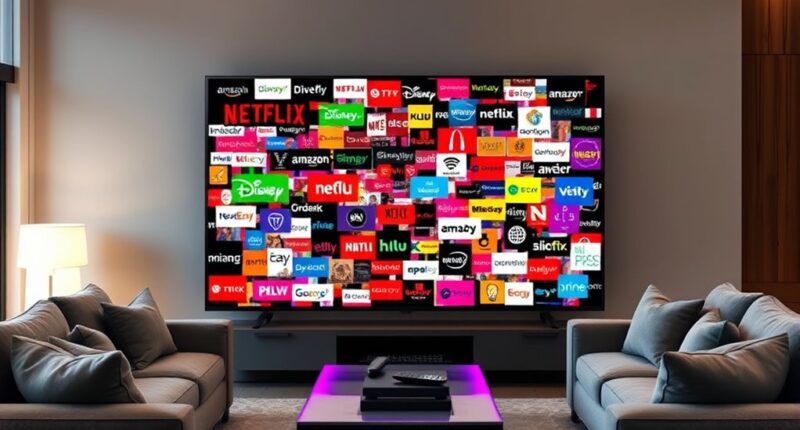Consolidation in the streaming industry means you’ll see fewer platforms competing for your subscriptions, often with big companies merging or acquiring smaller services. This leads to more exclusive content, which can make subscribing to multiple services necessary to access your favorite shows and movies. Prices may rise as libraries fragment, and you might face subscription fatigue. If you want to understand how these shifts impact your entertainment options and costs, there’s plenty more to explore.
Key Takeaways
- Industry consolidation reduces the number of independent streaming platforms, affecting content diversity and access.
- Mergers lead to increased investment in exclusive original content, encouraging multiple subscriptions.
- Fragmented libraries and rising costs make managing multiple streaming services more complex and expensive.
- Viewers may face limited access to certain titles due to licensing priorities of larger companies.
- Strategic platform choices become essential for maximizing entertainment value amid ongoing industry shifts.

Have you noticed how the streaming landscape has transformed the way we watch TV and movies? It’s become a central part of our entertainment routine, offering a variety of platforms that cater to nearly every taste. But with this growth comes intense competition among providers, leading to significant consolidation in the industry. When major companies merge or acquire smaller services, it changes the game for viewers like you. One of the most noticeable shifts is in the availability of exclusive content. Larger streaming giants often invest heavily in original shows and movies that you can’t find anywhere else. This means you’re encouraged to subscribe to multiple services if you want access to all these unique titles. While this offers a broader selection of content, it also raises questions about whether you’re truly getting value for your subscription costs.
As these companies consolidate, they often prioritize producing exclusive content to attract and retain subscribers. This strategy makes sense from a business standpoint—if you want to watch that new hit series or blockbuster film, you need to be on the platform that has it. However, it can also lead to subscription fatigue, as you find yourself juggling several different accounts just to keep up with your favorite shows. The rising subscription costs become a concern here, especially when new services launch with their own content libraries. Instead of one affordable service, you might end up paying for two, three, or even more, which can stretch your entertainment budget thin. It’s worth considering whether the quality and quantity of exclusive content justify these costs or if you’re better off sticking with fewer platforms.
Consolidation also affects the availability of content you love. When companies merge, they sometimes prioritize their own original productions over acquired titles, which can limit your choices. On the flip side, larger companies may also have more resources to produce high-quality content, elevating the overall viewing experience. Still, the increased costs and fragmented libraries can become frustrating. Ultimately, the ongoing consolidation reshapes the landscape into one where you must weigh the benefits of access to exclusive content against the rising subscription costs. You’ll find yourself making more strategic decisions about which platforms to subscribe to, based on what shows or movies matter most to you. As the industry continues to evolve, staying informed about these changes helps you make smarter choices and get the most value from your entertainment budget. Additionally, understanding content licensing trends can help you anticipate which titles may become unavailable in the future.
Frequently Asked Questions
How Will Consolidation Affect Streaming Service Prices?
Consolidation can lead to higher streaming service prices, affecting your subscription affordability. When fewer companies control the market, they may raise prices due to decreased competition, making it harder for you to find affordable options. However, if consolidation sparks innovation and better bundles, it could benefit you. Overall, market competition usually keeps prices in check, but watch for price hikes as companies aim for increased profits.
Will Original Content Quality Decline With Mergers?
Yes, original content quality might decline with mergers because companies could prioritize cost-cutting over creative freedom. When big corporations merge, they often tighten control, limiting the variety and innovation in original content. You may notice less daring or diverse stories, as creators face more restrictions. This reduction in creative freedom can lead to a decrease in the overall quality of original content, impacting your viewing experience over time.
How Might Consolidation Impact Content Diversity?
Consolidation might limit content diversity, making algorithms less transparent and reducing user choice. When fewer companies control streaming platforms, they may prioritize popular genres or their own productions, narrowing options. This could lead to homogenized content and less exposure to diverse voices. As a viewer, you might find it harder to discover unique stories, and less transparency in algorithms could keep you from understanding why certain content appears or is hidden.
What Are the Privacy Implications for Viewers?
You should be aware that consolidation can threaten your data privacy, as larger companies might track your viewing habits across multiple platforms. This increased user tracking raises concerns about how your personal information is collected and used. You might find your data shared or sold, which could lead to targeted ads or privacy breaches. Stay vigilant by reading privacy policies and adjusting your settings to protect your data privacy.
Could Consolidation Lead to Fewer Streaming Options?
Yes, consolidation could lead to fewer streaming options for you. When major companies merge, market competition often drops, reducing the variety of platforms available. This can limit your consumer choice, making it harder to find unique content or affordable plans. As fewer providers dominate the industry, you might face higher prices and less diversity in programming, ultimately impacting your viewing experience and options for entertainment.
Conclusion
As the streaming saga surges and spreads, remember that consolidation can create both convenience and concern. While fewer platforms might mean simpler streaming, it also raises risks of reduced choices and rising costs. Stay savvy, stay selective, and scrutinize your subscriptions. By staying informed and involved, you can safeguard your streaming experience, ensuring it remains satisfying and sustainable. So, watch wisely, weigh what’s worthwhile, and wield your streaming wisdom to navigate this ever-evolving entertainment ecosystem.









